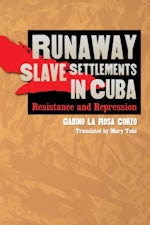Voices of the Enslaved in Nineteenth-Century Cuba
A Documentary History
By Gloria García Rodríguez
Translated by Nancy L. Westrate
Foreword by Ada Ferrer
240 pp., 6.125 x 9.25, 8 tables, notes, bibl., index
-
Paperback ISBN: 978-0-8078-7194-2
Published: October 2011 -
E-book PDF ISBN: 979-8-8908-7875-5
Published: October 2011 -
E-book EPUB ISBN: 978-0-8078-7767-8
Published: October 2011
Latin America in Translation
Buy this Book
- Paperback $37.50
- E-Book $27.99
For Professors:
Free E-Exam Copies
About the Author
Gloria García Rodríguez, a historian, is a researcher at the Institute of History in Havana.
For more information about Gloria García Rodríguez, visit
the
Author
Page.
Reviews
"Should be required reading for both students and senior scholars who work on slavery in Cuba and the Caribbean. The book will be of great value as a text for undergraduate students."--The Historian
“A useful synthesis of the evolution of slavery in the Cuban economy.”--Latin American Research Review
“[Rodriguez] does a skillful job of pointing out that slavery was not imposed by physical violence alone.”--Latin American Research Review
"Pioneering. . . . García is not trying to give us an unmediated voice of the enslaved; she knows that is likely impossible. But she does succeed in laying before us a view of enslavement from within the confines of the plantation, in the process giving us a much fuller and richer picture of the interior world of Cuban slavery than any yet available."--Ada Ferrer, from the foreword
"This collection excels at restoring a strong agency to slaves who are sometimes viewed as faceless, supine, downtrodden, and incapable of responding to their servile conditions. Slaves did not just work, riot, and die violent, premature deaths. Garcia beautifully recovers the rich abilities, insights, and collective will of Cuba's slaves through their own words. An invaluable and thorough introduction to a new world slave system."--Franklin W. Knight, The Johns Hopkins University




